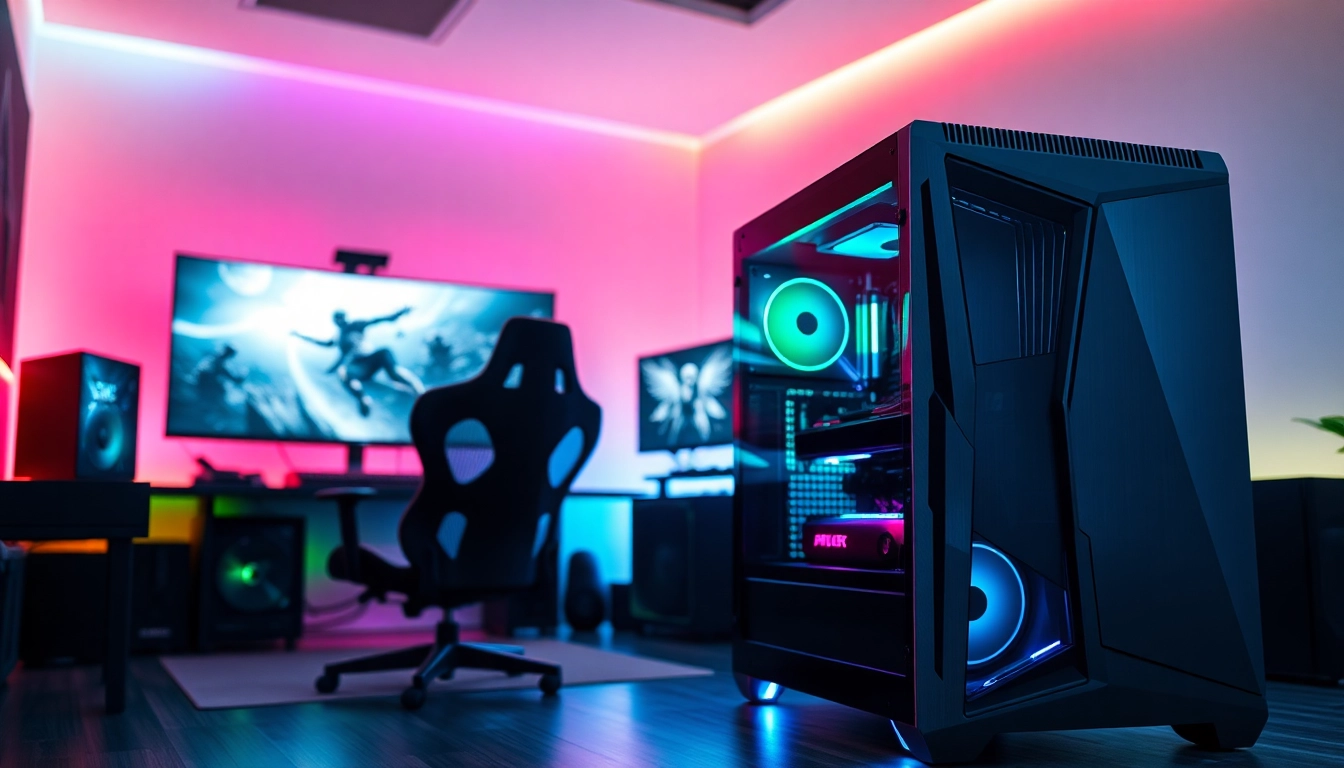
Understanding Gaming Computers
Gaming computers have evolved significantly over the years, transforming from basic machines into powerful beasts designed for intense gaming experiences. A gaming computer stands apart from regular PCs due to its specialized components and designs aimed at delivering high performance and graphics capabilities. In this article, we will delve into the different aspects of gaming computers, helping you understand why they are built the way they are and what you should consider when choosing one.
What Makes a Gaming Computer Different?
The fundamental difference between a gaming computer and a standard PC lies in its hardware configuration and software optimization. Gaming computers are specifically engineered to handle high-performance tasks, particularly 3D rendering and real-time processing that gaming demands. This is achieved through a combination of powerful CPUs, high-end GPUs, advanced cooling solutions, and larger power supplies.
Moreover, many gaming computers come with enhancements such as customizable RGB lighting, ergonomic designs, and advanced sound cards that further enrich the gaming experience. Unlike general-purpose computers, gaming machines prioritize graphics, sound, and speed, making them better suited for gamers who want the latest and greatest in performance and visuals.
Key Components that Enhance Performance
To understand gaming computers, it’s essential to consider the core components that significantly enhance their performance:
- Graphics Processing Unit (GPU): The heart of any gaming computer, the GPU renders images, animations, and videos with stunning detail. Modern cards from manufacturers like NVIDIA and AMD offer superior performance and are critical for high-resolution gaming.
- Central Processing Unit (CPU): While the GPU handles graphics, the CPU manages the overall performance and task processing. Multi-core processors are recommended for a seamless gaming experience.
- Random Access Memory (RAM): Sufficient RAM allows games to run smoothly, especially those with extensive open worlds or real-time online interactions. 16GB is now the standard for modern gaming.
- Storage: SSDs (Solid-State Drives) provide faster load times than traditional HDDs, ensuring games launch quickly and run without lag.
- Motherboard: A high-quality motherboard supports advanced features like overclocking and enhanced cooling, contributing to overall performance.
- Cooling Systems: Efficient cooling prevents overheating during intense gaming sessions, ensuring that performance doesn’t degrade due to thermal throttling.
Common Misconceptions about Gaming Computers
With the rise of esports and PC gaming, several misconceptions about gaming computers have emerged. One common myth is that gaming computers are solely for gaming; however, they are also fantastic for creative tasks, such as video editing, graphic design, and digital content creation due to their high computational abilities.
Another misconception is that gaming computers are prohibitively expensive. While high-end models can be costly, many components are budget-friendly, and it’s entirely possible to build or purchase a capable gaming PC without breaking the bank. Additionally, many believe that all gaming computers need to be heavily customized—this isn’t the case, as many pre-built options provide outstanding performance right out of the box.
Choosing the Right Gaming Computer
When it comes to selecting a gaming computer, the choices can be overwhelming. To navigate this landscape, it’s crucial to assess your budget and performance requirements properly so that you end up with a machine that offers the best gaming experience suited to your needs.
Budget vs. Performance: Finding the Balance
The first step in choosing the right gaming computer is understanding the balance between budget and performance. It is essential to determine how much you are willing to spend and what performance level you expect. For casual gamers, a mid-range system may suffice, while hardcore gamers or enthusiasts might want to invest in high-end components.
Setting a budget before shopping helps filter options effectively. Remember that high performance shouldn’t always correlate with high prices; deals can often be found, especially if you keep an eye out for discounts or consider slight downgrades in components that still meet your performance needs.
Recommended Specs for Different Gaming Styles
Different types of games have varying requirements for optimal performance. Here’s a breakdown of recommended specifications based on gaming style:
- Casual Gaming: A budget setup with an Intel i5 or AMD Ryzen 5 CPU, 8GB of RAM, and an entry-level GPU like NVIDIA GTX 1650 can manage most games at medium settings.
- Competitive Gaming: For competitive titles like “Fortnite” or “CS:GO,” aim for Intel i7 or Ryzen 7 CPUs, at least 16GB of RAM, and GPUs like the RTX 3060 or better for high frame rates.
- AAA Gaming: To play graphically-intensive games at ultra settings, look for high-end CPUs like Intel i9 or Ryzen 9, 32GB of RAM, and top-tier GPUs, such as the RTX 3080 or AMD’s RX 6800 XT.
Pre-built vs. Custom Gaming Computers
One of the significant decisions when selecting a gaming computer is whether to opt for a pre-built system or to build a custom one. Pre-built gaming PCs offer convenience, professional assembly, and often come with customer support and warranty services.
Custom-built systems, on the other hand, allow you to select every component according to your preference and budget, often resulting in better value for performance. However, they require some technical knowledge for assembly and troubleshooting. Consider your technical comfort level and whether you prefer convenience or customization while making this choice.
Essential Accessories for Your Gaming Setup
No gaming experience is complete without the right accessories. From monitors to peripherals, these tools enhance gameplay and help you get the most from your gaming computer.
Key Peripherals to Enhance Gameplay
Investing in high-quality peripherals can significantly affect your gaming performance and comfort. Consider the following:
- Mouse: A gaming mouse with customizable DPI settings, programmable buttons, and a comfortable grip improves precision and control.
- Keyboard: Mechanical keyboards are favored for their tactile feedback and durability. The choice between RGB lighting and additional macro keys can enhance the experience.
- Headset: High-quality audio is vital in gaming. Look for headsets that offer immersive sound quality, comfortable fit, and good microphones for communication in multiplayer scenarios.
Monitors: The Heart of Your Gaming Experience
The monitor is often the centerpiece of a gaming setup. Here are some factors to consider when choosing a gaming monitor:
- Resolution: A higher resolution provides better image quality. Consider 1080p (Full HD) for casual gaming, 1440p (QHD) for a balance of quality and performance, and 4K for an unparalleled visual experience.
- Refresh Rate: A higher refresh rate (120Hz or above) reduces motion blur, providing smooth visuals and improving responsiveness, crucial for competitive gaming.
- Response Time: Look for a monitor with a low response time (1ms to 5ms) to reduce ghosting and blurring during fast-paced gaming scenarios.
Optimal Networking Equipment for Gaming
A stable and fast internet connection is fundamental for online gaming. Upgrading your networking equipment can enhance your gaming experience:
- Router: Invest in a gaming router that reduces latency, improves reliability, and can prioritize traffic for gaming to minimize lag.
- Ethernet Cable: Wired connections are generally preferable over Wi-Fi for stability and speed. Use at least Cat6 cables for optimal bandwidth.
- Network Switch: If multiple devices connect simultaneously, a network switch can help manage bandwidth effectively.
Maintaining Your Gaming Computer
To ensure longevity and peak performance, regular maintenance of your gaming computer is essential. Here are some practices to keep your system in top shape.
Cleaning and Upgrading for Better Performance
Over time, dust and debris can accumulate inside your gaming computer, leading to overheating and decreased performance. Regular cleaning regimes, including blowing out dust with compressed air and cleaning components, help mitigate these issues.
Moreover, keep your computer up to date with the latest drivers and software updates to take advantage of any performance optimizations. Upgrading components such as adding more RAM or switching to an NVMe SSD can significantly boost performance and responsiveness.
Monitoring Performance Metrics
Utilizing software tools to monitor performance metrics like CPU and GPU temperatures, frame rates, and usage statistics can help identify potential issues early. Tools such as MSI Afterburner and HWiNFO are popular for tracking these metrics, allowing you to make informed decisions on when to upgrade or optimize your system.
Best Practices for Longevity
To prolong the life of your gaming computer, consider the following best practices:
- Ensure proper cooling through adequate ventilation and an efficient cooling system.
- Keep your operating system and software clean and up-to-date.
- Avoid overclocking unless you are knowledgeable about the process, as it can lead to unstable system behavior.
Future Trends in Gaming Computers
The gaming computer landscape is constantly evolving, driven by advances in technology and shifts in gaming culture. Staying informed on future trends can help you make educated decisions about your gaming setup.
Emerging Technologies to Watch
Several emerging technologies are set to revolutionize gaming computers:
- AI Integration: With AI becoming increasingly prevalent in game development, gaming computers will need hardware capable of managing AI-backed graphics and gameplay mechanics seamlessly.
- Cloud Gaming: As services like Google Stadia and NVIDIA GeForce NOW improve, gaming computers will adapt to optimize performance for games streamed from cloud servers, shifting the focus on hardware dependence.
- High Dynamic Range (HDR): Expect more gaming monitors and TVs to support HDR, delivering richer colors and contrast, enhancing overall visual experiences.
Impact of VR and AR on Gaming Computers
The rise of Virtual Reality (VR) and Augmented Reality (AR) is transforming how games are played. As these technologies gain traction, the demand for higher frame rates, lower latency, and more responsive hardware will become imperative for gaming PCs. The gaming community might see more specialized components designed specifically for VR experiences, necessitating upgrades and innovations in the gaming computer market.
Predictions for Gaming Computer Innovations
Looking ahead, the gaming computer sector is poised for transformative innovations:
- Modularity: Future gaming computers may introduce highly modular designs, allowing users to upgrade specific components without replacing the entire system.
- Improved Energy Efficiency: With an increased consideration for environmental sustainability, expect gaming hardware manufacturers to focus on energy efficiency without sacrificing performance.
- Advancements in Cooling Solutions: Enhanced cooling technologies, including liquid cooling and innovative designs, will likely reduce thermal throttling and enhance performance during extended gaming sessions.
Conclusion
As gaming technology continues to evolve, understanding the dynamics of gaming computers will empower you to make informed decisions about your hardware setup. From differentiating between essential components to predicting future trends, having a comprehensive guide empowers gamers at every skill level. Whether you’re purchasing a gaming machine, building your own, or upgrading an existing system, the right information is critical for optimizing your gaming experience.






